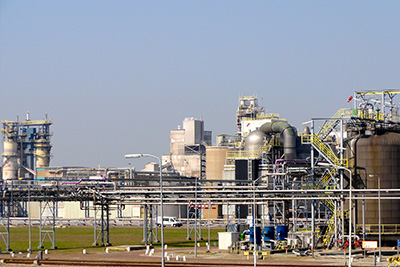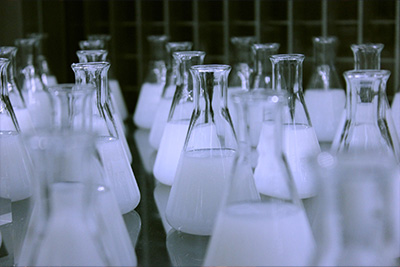-
![Supply Chain Manag···]() 2024-12-10 Supply Chain Management of Tin Ore f···
2024-12-10 Supply Chain Management of Tin Ore f···The management of tin ore in the supply chain for reverse ester production involves several critical steps. It starts with sourcing high-quality tin ore from reliable mines, ensuring consistent supply and quality. Transportation logistics must be meticulously planned to minimize delays and costs, often requiring specialized handling due to the ore's characteristics. Storage facilities need to maintain optimal conditions to prevent degradation. Further, integration with ester production processes demands precise scheduling and coordination to synchronize raw material availability with manufacturing needs. Efficient supply chain management in this context is crucial for maintaining product quality and overall operational efficiency.
read more > -
![The Role of Revers···]() 2024-12-10 The Role of Reverse Ester Tin in Hig···
2024-12-10 The Role of Reverse Ester Tin in Hig···Reverse ester tin plays a crucial role in enhancing the performance of polymer additives. These additives, when incorporated into polymeric materials, improve properties such as thermal stability, transparency, and processability. Reverse ester tin acts as an efficient heat stabilizer, preventing degradation during processing and use. Additionally, it facilitates better dispersion of other additives within the polymer matrix, leading to enhanced overall performance. This makes reverse ester tin an indispensable component in the production of high-performance polymers used in various applications, from packaging to automotive parts.
read more > -
![Advanced Reactor D···]() 2024-12-10 Advanced Reactor Designs for Reverse···
2024-12-10 Advanced Reactor Designs for Reverse···Advanced reactor designs for reverse esterification using tin catalysts have gained attention due to their potential to enhance efficiency and product yield. These innovative systems focus on optimizing reaction conditions, such as temperature and pressure, to improve the conversion of carboxylic acids into esters. Key features include continuous flow reactors, microreactors, and reactive distillation units, which facilitate better control over reaction parameters and enable more efficient separation of products. This advancement aims to address the limitations of traditional batch processes, offering a more sustainable and economically viable approach to ester production.
read more > -
![Tin-Based Catalyst···]() 2024-12-10 Tin-Based Catalysts: Essential Prope···
2024-12-10 Tin-Based Catalysts: Essential Prope···Tin-based catalysts play a crucial role in reverse esterification reactions, exhibiting essential properties such as high catalytic activity and selectivity. These catalysts, typically comprising tin salts or organotin compounds, effectively promote the conversion of carboxylic acids to esters under mild conditions. Key attributes include their ability to facilitate reversible esterification, enhance reaction rates, and maintain stability over multiple reaction cycles. The choice of tin precursor and reaction parameters significantly influences the efficiency and outcome of the process, making tin-based catalysts a promising option for sustainable chemical synthesis.
read more > -
![Reverse Ester Tin ···]() 2024-12-10 Reverse Ester Tin Catalysts: Effect ···
2024-12-10 Reverse Ester Tin Catalysts: Effect ···Reverse ester tin catalysts have been shown to significantly influence reaction rates and product quality in various chemical processes. These catalysts, which include compounds like tin(II) 2-ethylhexanoate, enhance the efficiency of esterification reactions by facilitating the breakage and formation of C-O bonds. Their use leads to higher yields and purer products compared to traditional catalysts. Studies indicate that these tin-based catalysts not only speed up the reaction process but also improve the overall quality of the final product by minimizing side reactions and impurities. Thus, reverse ester tin catalysts represent a valuable advancement in catalysis, offering both economic and environmental benefits due to their enhanced performance and reduced waste production.
read more > -
![Economic Analysis ···]() 2024-12-10 Economic Analysis of Reverse Ester T···
2024-12-10 Economic Analysis of Reverse Ester T···This study conducts an economic analysis of reverse ester tin supply chains, examining the financial implications and efficiency of recycling processes. It evaluates cost structures, market dynamics, and environmental impacts associated with reverse logistics in the tin industry. The research highlights key factors influencing profitability and sustainability, providing insights for stakeholders to optimize supply chain strategies and enhance economic outcomes.
read more > -
![Reverse Ester Tin ···]() 2024-12-10 Reverse Ester Tin in Industrial Coat···
2024-12-10 Reverse Ester Tin in Industrial Coat···The article explores the innovative use of reverse ester tin in industrial coatings, highlighting its potential for enhancing performance and sustainability. Reverse ester tin offers new applications due to its unique chemical properties, which improve coating durability, flexibility, and resistance to environmental factors. This technology not only optimizes the coating process but also contributes to reduced volatile organic compound (VOC) emissions, aligning with environmental regulations. The benefits include extended product lifespan, improved aesthetics, and cost-efficiency, making it a promising advancement in the industrial coatings sector.
read more > -
![Key Trends in Reve···]() 2024-12-10 Key Trends in Reverse Ester Tin for ···
2024-12-10 Key Trends in Reverse Ester Tin for ···The plastics industry is witnessing significant trends in reverse esterification technology, which is transforming manufacturing processes. This innovative approach enhances efficiency and reduces environmental impact by optimizing catalyst usage and minimizing waste. Key advancements include improved reaction kinetics, better product quality, and higher yields. Additionally, the adoption of reverse esterification supports sustainability goals by enabling the use of bio-based feedstocks and lowering energy consumption. These developments are reshaping the industry's landscape, making it more sustainable and competitive.
read more > -
![Importance of Tin ···]() 2024-12-10 Importance of Tin Purity in Industri···
2024-12-10 Importance of Tin Purity in Industri···The purity of tin plays a crucial role in the industrial synthesis of esters. Impurities in tin can lead to unwanted side reactions, reducing the yield and quality of the final ester product. High-purity tin ensures efficient catalysis, optimal reaction conditions, and minimizes contamination, thereby enhancing the overall process efficiency and product integrity. This underscores the necessity of using pure tin in ester manufacturing processes to achieve high-quality outputs.
read more >








